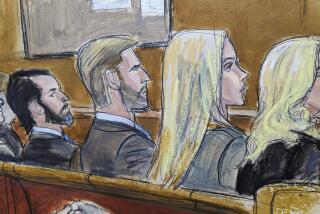Verdict Begins in Yukos Trial
- Share via
MOSCOW — A panel of judges found Monday that a former top oil tycoon committed fraud and tax evasion, but adjourned for the day without pronouncing a final verdict in a trial widely seen as a gauge of Russia’s commitment to democratic reform and private enterprise.
As his supporters chanted “Freedom!” outside the courthouse and clashed briefly with police, former Yukos Oil Co. Chief Executive Mikhail Khodorkovsky listened expressionless as judges began reading hundreds of pages detailing the crimes they found he had committed at the helm of the most successful company to emerge from the collapse of the Soviet Union.
The court is expected to finish reading the voluminous verdict later this week and rule whether to impose the 10-year prison sentence sought by the prosecution.
“I believe that we are going to witness a case which will, in fact, determine the future of Russia,” Irina Khakamada, leader of the pro-democracy Our Choice movement and a former legislator, said outside the courthouse.
“If the judges -- which I doubt -- pass a not-guilty verdict, then we can hope that Russia has a chance of being a free country for a free people,” she said. “If there is a guilty verdict, we may just as well give up all hope and rely only on ourselves.”
Lawyers said the judges’ ruling so far closely mirrored the language of the indictment against Khodorkovsky and his business partner, Platon Lebedev, an indication the court might be preparing to convict the former oil tycoon.
“It is clear from the very first words that this will be a guilty verdict. They will be found guilty on all counts. The judge is marching toward the target set from the very beginning,” said Khodorkovsky’s wife, Inna. “But I am proud of my husband. His composure is amazing.”
Inna Khodorkovsky entered the courtroom with her mother-in-law, both wearing sunglasses. Khodorkovsky gazed fondly at his wife, straining to see over a guard, and made a gesture to her as if to be reassuring.
She laughed heartily and took off her glasses, revealing dark circles under her eyes.
Khodorkovsky’s personal fortune was once put at $15 billion, which made him Russia’s wealthiest businessman and a potential rival to Russian President Vladimir V. Putin. The 41-year-old is now believed to be worth about $2 billion.
The tycoon ran Yukos from 1997 to 2003, acquiring the 2.4-million-barrel-a-day oil company from the state in a bargain-basement privatization deal. He turned it into an efficient, publicly traded company that was poised to become one of the biggest oil companies in the world.
Khodorkovsky’s arrest in October 2003 followed his funding of opposition political parties and his challenge of oil tax legislation and the government’s monopoly on oil pipelines.
Since his arrest, Yukos has been hammered with a bill for $27.5 billion in back taxes, which put the company on the verge of bankruptcy and in effect forced the renationalization of its primary production unit through a tax sale late last year to a government-controlled firm.
Government prosecutors said Khodorkovsky and Lebedev had set up their own downfall by evading billions of dollars in taxes, funneling money through shell companies and engineering various stock manipulation schemes. The public -- irate over Russia’s wealth slipping into the hands of rich businesspeople during the nation’s early years of capitalism in the 1990s -- has applauded the prosecution.
But critics, including the U.S. government, say less politically active businesspeople have not been imprisoned for similar transgressions.
Khodorkovsky’s lawyers said the trial was engineered to produce a conviction, with little opportunity to present a meaningful defense, despite 11 months of tedious, repetitive court hearings.
“I was hoping that I would hear something new, something more or less reasonable in the verdict, but so far what I am hearing is the indictment,” defense attorney Yuri Shmidt said after Monday’s recess. “I understand perfectly well that we can’t expect a fair verdict for Lebedev and Khodorkovsky, but in my heart of hearts, I frankly expected a different verdict than what I am hearing now.”
The tycoon’s mother, Marina Khodorkovskya, blamed her son’s problems on Putin. “Frankly, I am even kind of sorry for Putin,” she said. “More and more people are beginning to despise him, and their number will grow after this fictitious trial.”
Hundreds of people filled the sidewalk outside the court, many waving balloons and wearing T-shirts calling for Khodorkovsky’s release with the words, “Khodorkovsky go home.”
Sergei Mitrokhin, deputy chief of the pro-business Yabloko party, was arrested along with the party’s youth leader after a brief scuffle with police, who were trying to clear the sidewalks of Khodorkovsky supporters at the end of the hearing.
“In the time of Soviet power, they made speechless idiots out of us, those whom power guided however it wished,” said Valentina Yanishevskaya, a retired Central Bank employee. “We had sipped a taste of freedom, and now, all of a sudden, we got what we have today: It’s not a life, but a nightmare.”
Shouting matches broke out when others voiced their support for the prosecution. “Khodorkovsky is a hooligan,” said Alexander Mikhailovich, a 74-year-old pensioner. “But this trial makes all the other oligarchs who are hiding behind Khodorkovsky scared. They will try to take their money and leave for the West.”
*
Times staff writer Sergei L. Loiko contributed to this report.
More to Read
Sign up for Essential California
The most important California stories and recommendations in your inbox every morning.
You may occasionally receive promotional content from the Los Angeles Times.













